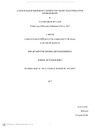| heal.creatorName | Nikoloudakis, Ioannis | en |
| heal.creatorName | Νικολουδάκης, Ιωάννης | el |
| heal.publicationDate | 2017-09-18 | |
| heal.identifier.primary | http://hdl.handle.net/20.500.12688/8386 | |
| heal.abstract | The combination of Assisted Living (AL) and Ambient Intelligence (AmI) paradigms, has given birth to a multidisciplinary scientific/technological domain, known as the “Ambient Assisted Living” (AAL). Its aim is to improve the quality of citizen’s life through context-aware environments that can be adapted to each individual’s requirements for improving his/her daily life, especially those with physical/mental disabilities. Enhanced with state-of-the art Information & Communication Technologies (ICTs), AAL provides the means for better, safer and more secure living environments by monitoring citizen’s activities, gathering/processing and analyzing real-time data related to his health/behavior, and proactively alarming (in case of emergency) those in charge (e.g. doctors, physicians, first responders, etc.) and/or his family members. For example, people who suffer from cognitive impairment diseases, such as Alzheimer’s, dementia, cerebral palsy etc., need to be constantly monitored about their location in space, since it is very common for this kind of people to leave their premises and be unable to return. In such cases, AAL may assist persons-in-charge (e.g. house-nurses, family members, neighbors, etc.) by informing them about the patient’s exact position, or by proactively alarming first-responders (e.g. caretakers, doctors, hospital, police, etc.) in case of a potential threats/emergency.
Since the majority of AAL services and applications deal with large volume of data that require fast processing and resource-demanding infrastructure for rapid analysis and response/results, typical/common home-based computing platforms become obsolete, while sophisticated installations prove to be too costly. Thus, the Cloud Computing paradigm for remote resources provision along with the Services’ Virtualization concept for assets’ elasticity and scalability arise as the driving forces in AAL deployment, due to its omnipresence and resource-rich characteristics.
In this thesis, we propose such a virtualized cloud-based AAL system that enables health-cares and first-responders to constantly monitor a patient’s indoor/outdoor position and be alarmed in case of emergency. Positioning is made available through an embedded device (carried by the patient) that performs the proximity and cell identification techniques (Wi-Fi and GSM), which in turn sends the geolocation data to a Cloud-based application for further processing. In case that the patient drifts away from his/her premises, the application retrieves the closest-to-the-patient third party agents (hospital, police, volunteers, first-responders, etc.) through the Location-to-Service-Translation (LoST) protocol, and alerts them about the emergency situation via a SIP-based VoIP communication channel. Finally, a performance evaluation was performed, under controlled-conditions environment and results concerning the system’s response time were obtained. | en |
| heal.abstract | Σε αυτήν την εργασία, προτείνουμε ένα σύστημα για περιβάλλοντα υποβοηθούμενης διαβίωσης το οποίο επιτρέπει τη συνεχή παρακολούθηση της τοποθεσίας (μέσα και έξω) ατόμων που πάσχουν από ασθένειες όπως Αλτσχάϊμερ, άνοια ή εγκεφαλική παράλυση από τους ανθρώπους που τους φροντίζουν, και την ειδοποίηση τους σε περίπτωση επείγουσας ανάγκης. Η τοποθεσία του ασθενούς μπορεί και υπολογίζεται με τη χρήση μιας ενσωματωμένης συσκευής, την οποία κρατά ο ασθενής η οποία εκτελεί τεχνικές εγγύτητας και αναγνώρισης κυψέλης και έπειτα στέλνει τα γεωγραφικά δεδομένα στο Cloud για περαιτέρω ανάλυση. Σε περίπτωση που ο ασθενής, βγει έξω από τα προκαθορισμένα όρια, η εφαρμογή ανακτά τις κοντινότερες στο χρήστη αρχές (νοσοκομείο, αστυνομία, εθελοντές κλπ.) μέσω του πρωτοκόλλου LoST και τους ειδοποιεί για την επείγουσα κατάσταση μέσω του SIP πρωτοκόλλου VoIP επικοινωνίας. | el |
| heal.language | Αγγλικά | el |
| heal.language | English | en |
| heal.academicPublisher | Τ.Ε.Ι. Κρήτης, Σχολή Τεχνολογικών Εφαρμογών (Σ.Τ.Εφ), ΠΜΣ Πληροφορική και Πολυμέσα | el |
| heal.academicPublisher | T.E.I. of Crete, School of Engineering (STEF), PPS in Informatics and Multimedia | en |
| heal.title | A cloud-based emergency system for smart enhanced living environments. | en |
| heal.title | Ένα σύστημα έκτακτης ανάγκης βασισμένο στο cloud για έξυπνα ενισχυμένα περιβάλλοντα διαβίωσης. | el |
| heal.type | Μεταπτυχιακή Διατριβή | el |
| heal.type | Master thesis | en |
| heal.keyword | ambient assisted living, independent living, patient, cloud computing, session initiation protocol (SIP), VoIP, Information and Communications Technology (ICT) | en |
| heal.keyword | περιβάλλον υποβοηθούμενης διαβίωσης, ανεξάρτητη διαβίωση, ασθενής, υπολογιστική νέφους, πρωτόκολλο έναρξης συνόδου (SIP), VoIP, Τεχνολογία Πληροφοριών και Επικοινωνίας (ΤΠΕ) | el |
| heal.access | free | el |
| heal.advisorName | Pallis, Evangelos | en |
| heal.advisorName | Πάλλης, Ευάγγελος | el |
| heal.advisorID.email | pallis@ie.teicrete.gr | |
| heal.academicPublisherID | Τ.Ε.Ι. Κρήτης | el |
| heal.academicPublisherID | T.E.I. of Crete | en |
| heal.fullTextAvailability | true | el |
| tcd.distinguished | false | el |
| tcd.survey | false | el |


